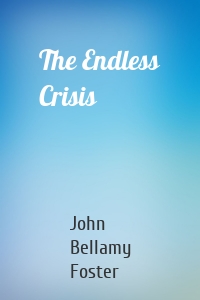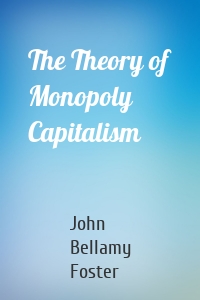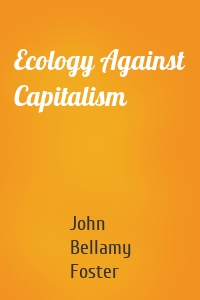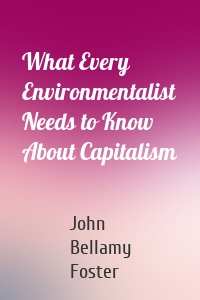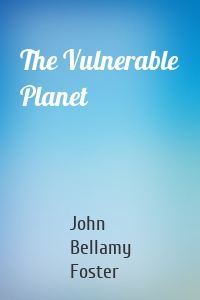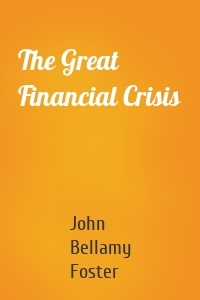John Bellamy Foster
9 кн.
Marx’s Ecology
Progress requires the conquest of nature. Or does it? This startling new account overturns conventional interpretations of Marx and in the process outlines a more rational approach to the current environmental crisis. Marx, it is often assumed, cared only about industrial growth and the development of economic forces. John Bellamy Foster examines Marx's neglected writings on capitalist agriculture and soil ecology, philosophical naturalism, and evolutionary theory. He shows that Marx, known...
| Автор | John Bellamy Foster |
The Endless Crisis
The days of boom and bubble are over, and the time has come to understand the long-term economic reality. Although the Great Recession officially ended in June 2009, hopes for a new phase of rapid economic expansion were quickly dashed. Instead, growth has been slow, unemployment has remained high, wages and benefits have seen little improvement, poverty has increased, and the trend toward more inequality of incomes and wealth has continued. It appears that the Great Recession has given way to a...
| Автор | John Bellamy Foster |
The Theory of Monopoly Capitalism
In 1966, Paul Baran and Paul Sweezy published Monopoly Capital,a monumental work of economic theory and social criticismthat sought to reveal the basic nature of the capitalism of theirtime. Their theory, and its continuing elaboration by Sweezy, HarryMagdoff, and others in Monthly Review magazine, infl uenced generationsof radical and heterodox economists. They recognizedthat Marx’s work was unfi nished and itself historically conditioned,and that any attempt to understand capitalism...
| Автор | John Bellamy Foster |
Ecology Against Capitalism
In recent years John Bellamy Foster has emerged as a leading theorist of the Marxist perspective on ecology. His seminal book Marx's Ecology (Monthly Review Press, 2000) discusses the place of ecological issues within the intellectual history of Marxism and on the philosophical foundations of a Marxist ecology, and has become a major point of reference in ecological debates. This historical and philosophical focus is now supplemented by more directly political engagement in his new book,...
| Автор | John Bellamy Foster |
What Every Environmentalist Needs t...
Praise for Foster and Magdoff’s The Great Financial Crisis: In this timely and thorough analysis of the current financial crisis, Foster and Magdoff explore its roots and the radical changes that might be undertaken in response. . . . This book makes a valuable contribution to the ongoing examination of our current debt crisis, one that deserves our full attention.—Publishers WeeklyThere is a growing consensus that the planet is heading toward environmental catastrophe:...
| Автор | John Bellamy Foster |
The Vulnerable Planet
From reviews of the first edition (1994): "Extraordinarily well written . . . " –Contemporary Sociology "A readable chronicle aimed at a general audience . . . Graceful and accessible . . . " –Dollars and Sense «Has the potential to be a political bombshell in radical circles around the world.» –Environmental Action The Vulnerable Planet has won respect as the best single-volume introduction to the global economic crisis. With impressive historical and economic detail, ranging from the...
| Автор | John Bellamy Foster |
Trump in the White House
Remember that metaphor about the frog that slowly cooks to death in the pot of increasingly warm water? Leftists have used it for years to describe how people can accept dwindling health care, fading job opportunities, eroding racial and gender equality—as long as the loss occurs gradually. Now, with Donald Trump having slouched off to Washington, most of the mainstream media are working overtime to convince us that we can still stand the heat. Leave it to John Bellamy Foster, one of...
| Автор | John Bellamy Foster |
The Great Financial Crisis
In the fall of 2008, the United States was plunged into a financial crisis more severe than any since the Great Depression. As banks collapsed and the state scrambled to organize one of the largest transfers of wealth in history, many—including economists and financial experts—were shocked by the speed at which events unfolded.In this new book, John Bellamy Foster and Fred Magdoff offer a bold analysis of the financial meltdown, how it developed, and the implications for the...
| Автор | John Bellamy Foster |




